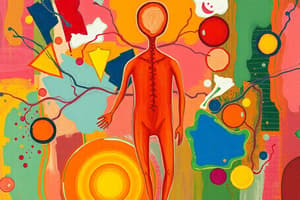Podcast
Questions and Answers
What is DEE?
What is DEE?
- The energy required to maintain life while at rest
- The amount of energy an adult requires daily (correct)
- The energy related to processing food
- The energy required for physical activity
What are the components of DEE?
What are the components of DEE?
- Water intake, voluntary physical activities, and DIT
- BMR, water intake, and DIT
- BMR, voluntary physical activities, and protein intake
- BMR, voluntary physical activities, and DIT (correct)
What is BMR?
What is BMR?
- The amount of energy an adult requires daily
- The energy required for physical activity
- The energy required to maintain life while at rest (correct)
- The energy related to processing food
What affects BMR?
What affects BMR?
What is the recommended fat intake?
What is the recommended fat intake?
How is protein requirement determined?
How is protein requirement determined?
What is the ideal/desirable body weight range according to BMI?
What is the ideal/desirable body weight range according to BMI?
What are macronutrients and micronutrients?
What are macronutrients and micronutrients?
What is the estimated BMR for an adult female?
What is the estimated BMR for an adult female?
What is the recommended daily fat intake as a percentage of total energy intake?
What is the recommended daily fat intake as a percentage of total energy intake?
What is the estimated energy related to processing food?
What is the estimated energy related to processing food?
What is the ideal body weight range based on BMI?
What is the ideal body weight range based on BMI?
What are the two types of nutrients?
What are the two types of nutrients?
What is the protein requirement based on?
What is the protein requirement based on?
What is the estimated energy required for voluntary physical activity?
What is the estimated energy required for voluntary physical activity?
What is the recommended dietary allowance based on?
What is the recommended dietary allowance based on?
Flashcards are hidden until you start studying
Study Notes
Nutrition and Body Weight
- Daily energy expenditure (DEE) is the amount of energy an adult requires, with adult males needing 12000 kJ and adult females needing 9500 kJ.
- Components of DEE include basal metabolic rate (BMR), voluntary physical activities, and diet-induced thermogenesis (DIT).
- BMR is the energy required to maintain life while at rest, estimated at 7000 kJ/day for adult males and 5800 kJ/day for adult females.
- Factors affecting BMR include body weight, thyroid hormones, adipose tissue, body temperature, pregnancy, and lactation.
- Voluntary physical activity is the energy required by skeletal and cardiac muscle, estimated by adding a percentage of BMR based on the level of activity.
- DIT is the energy related to processing food and is estimated at 10% of the energy content of ingested food.
- Total daily energy expenditure is calculated by summing BMR, energy required for physical activity, and 10% of these values to reflect DIT.
- Nutrients are divided into macronutrients (carbohydrates, fats, and proteins) and micronutrients (vitamins and minerals).
- Recommended dietary allowance/amount (RDA) is the quantity of nutrients required for the general population in good health and varies with age, gender, pregnancy, and lactation.
- Fat intake should be limited to 30% of total energy intake, with carbohydrates and protein making up 55% and 15%, respectively.
- Protein requirement is based on daily nitrogen balance, with 35 g of protein required for zero nitrogen balance.
- Water, dietary fiber, and minerals and vitamins are also necessary for a healthy diet, with water comprising 50-60% of body weight in normal weight adults and dietary fiber aiding in normal bowel function.
- Ideal or desirable body weight is associated with the lowest mortality and is determined by body mass index (BMI), with underweight being <18.5, desirable weight being 18.5-24.9, overweight being 25-29.9, obese being 30-34.9, and severely obese being ≥35.
Nutrition and Body Weight
- Daily energy expenditure (DEE) is the amount of energy an adult requires, with adult males needing 12000 kJ and adult females needing 9500 kJ.
- Components of DEE include basal metabolic rate (BMR), voluntary physical activities, and diet-induced thermogenesis (DIT).
- BMR is the energy required to maintain life while at rest, estimated at 7000 kJ/day for adult males and 5800 kJ/day for adult females.
- Factors affecting BMR include body weight, thyroid hormones, adipose tissue, body temperature, pregnancy, and lactation.
- Voluntary physical activity is the energy required by skeletal and cardiac muscle, estimated by adding a percentage of BMR based on the level of activity.
- DIT is the energy related to processing food and is estimated at 10% of the energy content of ingested food.
- Total daily energy expenditure is calculated by summing BMR, energy required for physical activity, and 10% of these values to reflect DIT.
- Nutrients are divided into macronutrients (carbohydrates, fats, and proteins) and micronutrients (vitamins and minerals).
- Recommended dietary allowance/amount (RDA) is the quantity of nutrients required for the general population in good health and varies with age, gender, pregnancy, and lactation.
- Fat intake should be limited to 30% of total energy intake, with carbohydrates and protein making up 55% and 15%, respectively.
- Protein requirement is based on daily nitrogen balance, with 35 g of protein required for zero nitrogen balance.
- Water, dietary fiber, and minerals and vitamins are also necessary for a healthy diet, with water comprising 50-60% of body weight in normal weight adults and dietary fiber aiding in normal bowel function.
- Ideal or desirable body weight is associated with the lowest mortality and is determined by body mass index (BMI), with underweight being <18.5, desirable weight being 18.5-24.9, overweight being 25-29.9, obese being 30-34.9, and severely obese being ≥35.
Studying That Suits You
Use AI to generate personalized quizzes and flashcards to suit your learning preferences.




